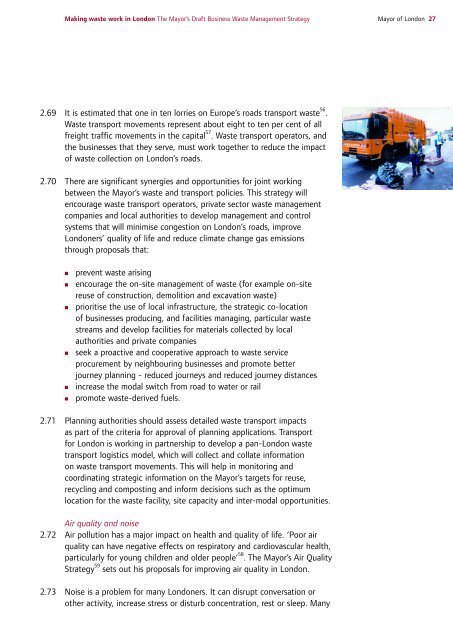Draft Business Waste Strategy PDF - london.gov.uk - Greater ...
Draft Business Waste Strategy PDF - london.gov.uk - Greater ...
Draft Business Waste Strategy PDF - london.gov.uk - Greater ...
Create successful ePaper yourself
Turn your PDF publications into a flip-book with our unique Google optimized e-Paper software.
Making waste work in London The Mayor’s <strong>Draft</strong> <strong>Business</strong> <strong>Waste</strong> Management <strong>Strategy</strong> Mayor of London 27<br />
2.69 It is estimated that one in ten lorries on Europe’s roads transport waste 56 .<br />
<strong>Waste</strong> transport movements represent about eight to ten per cent of all<br />
freight traffic movements in the capital 57 . <strong>Waste</strong> transport operators, and<br />
the businesses that they serve, must work together to reduce the impact<br />
of waste collection on London’s roads.<br />
2.70 There are significant synergies and opportunities for joint working<br />
between the Mayor’s waste and transport policies. This strategy will<br />
encourage waste transport operators, private sector waste management<br />
companies and local authorities to develop management and control<br />
systems that will minimise congestion on London’s roads, improve<br />
Londoners’ quality of life and reduce climate change gas emissions<br />
through proposals that:<br />
■ prevent waste arising<br />
■ encourage the on-site management of waste (for example on-site<br />
reuse of construction, demolition and excavation waste)<br />
■ prioritise the use of local infrastructure, the strategic co-location<br />
of businesses producing, and facilities managing, particular waste<br />
streams and develop facilities for materials collected by local<br />
authorities and private companies<br />
■ seek a proactive and cooperative approach to waste service<br />
procurement by neighbouring businesses and promote better<br />
journey planning - reduced journeys and reduced journey distances<br />
■ increase the modal switch from road to water or rail<br />
■ promote waste-derived fuels.<br />
2.71 Planning authorities should assess detailed waste transport impacts<br />
as part of the criteria for approval of planning applications. Transport<br />
for London is working in partnership to develop a pan-London waste<br />
transport logistics model, which will collect and collate information<br />
on waste transport movements. This will help in monitoring and<br />
coordinating strategic information on the Mayor’s targets for reuse,<br />
recycling and composting and inform decisions such as the optimum<br />
location for the waste facility, site capacity and inter-modal opportunities.<br />
Air quality and noise<br />
2.72 Air pollution has a major impact on health and quality of life. ‘Poor air<br />
quality can have negative effects on respiratory and cardiovascular health,<br />
particularly for young children and older people’ 58 . The Mayor’s Air Quality<br />
<strong>Strategy</strong> 59 sets out his proposals for improving air quality in London.<br />
2.73 Noise is a problem for many Londoners. It can disrupt conversation or<br />
other activity, increase stress or disturb concentration, rest or sleep. Many
















